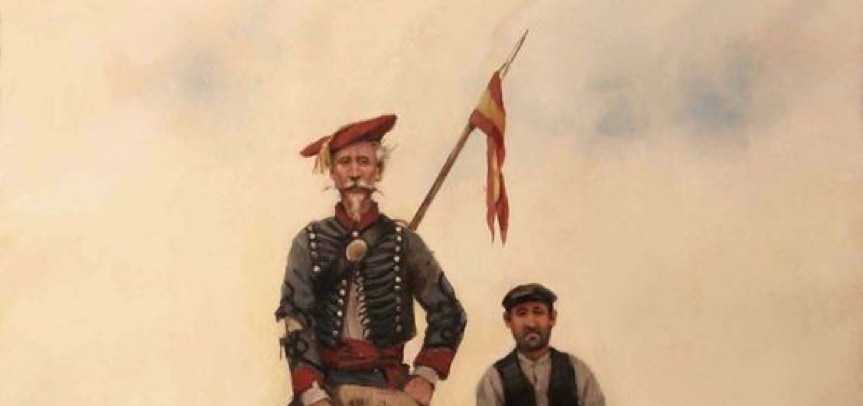
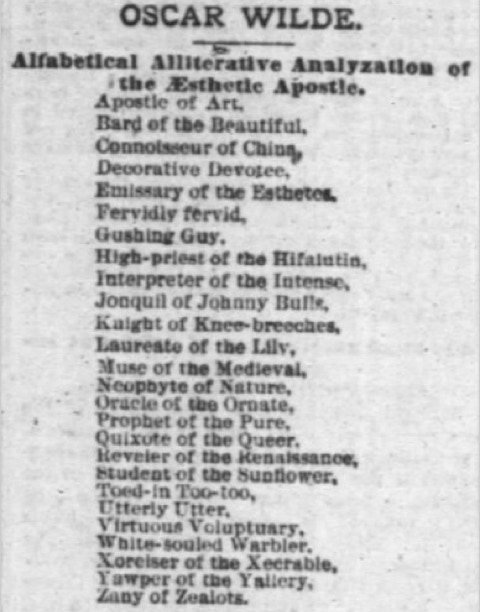
This verse parody was one of many such newspaper items that appeared in 1882 poking fun at Oscar Wilde and the Aesthetic Movement.
This one features an affected and satirical overuse of alliteration. Although Wilde was known for his occasional penchant for alliteration in his prose style (which Whistler later parodied) this was probably not recognized by the author of this verse when it was written in January 1882.
It is more likely that its use was prompted by expressions such as "too-too" and "utterly utter" that were connected to the also alliterative ‘Apostle of the Aesthetes’.
Source: Chicago Daily Tribune, January 25, 1882.
Apostle
One who is sent away, often as a teacher or missionary to the people. Wilde's stated mission was to educate the American people in art and culture.
Bard
In medieval Gaelic and British culture, a professional poet, employed by a patron. Wilde's patron was Richard D'Oyly Carte, promoter of Gilbert & Sullivan's Patience, a comic opera which, like this verse, was a parody of the Aesthetic Movement.
China
Another name for porcelain, a ceramic material used in pottery. Wilde said, or it was said of him, that he was trying to live up to his blue china.
Esthetes
An alternative spelling of aesthetes, who were members of a movement that emphasized beauty as an artistic value. Wilde was known as a leader of the late nineteenth century Aesthetic Movement.
Fervid
Intensely enthusiastic or passionate, especially to an excessive degree, as Wilde was assumed to be about aesthetic art.
Gushing
Effusive or exaggeratedly enthusiastic.
Hifalutin
Overblown and pretentious; bombastic. Wilde was parodied as being all of these.
Intense
This word had a particular meaning as it related to Aesthetic Movement. British decadent writers were much influenced by the Oxford professor Walter Pater who stated that life had to be lived intensely, with an ideal of beauty. His text Studies in the History of the Renaissance (1873), was a favorite of Wilde's. The word came to be used satirically to mean the same as other words in the verse such as fervid, gushing, and hifalutin.
Jonquil
A bulbous flowering plant (or its color, yellow) of the species Narcissus. Narcissus was also a mythological character who epitomized beauty and insecure vanity.
Johnny Bulls
John Bull is a personification of Great Britain, and England in particular, especially in political cartoons. He is usually depicted as a jolly, stout, middle-aged, country-dwelling man. Wilde was often referred to in America as English, but he was, in fact, Irish.
Knee-breeches
Trousers usually stopping just below the knee. They were worn for effect by Wilde while lecturing in America, and became a source of much ridicule, seen as anachronistic and pretentious.
Lily
Along with the sunflower, one of the floral emblems of the Aesthetic Movement. Wilde was fond of the word and became enamored of Lillie Langtry, often using the word in connection with her, although it was his male lover, Alfred Douglas, whom he called his 'lily of lilies' (Letters, 651).
Medieval
The Aesthetic Movement grew from the Pre-Raphaelite Brotherhood school of art whose prototypes harkened back to the simplistic styles of Medieval England (i.e. Pre-Raphael). Gilbert & Sullivan's Patience, which parodies the Aesthetic Movement, contains the following lines with which Wilde became associated:
Though the Philistines may jostle, you will rank as an apostle in the high aesthetic band,
If you walk down Piccadilly with a poppy or a lily in your mediaeval hand.
Nature
Another allusion to the natural milieu of the Aesthetic Movement such as flowers, birds, peacock feathers &c.
Ornate
A reference to Wilde's attention to the decorative arts.
Pure
The search for pure beauty in the Aesthetic Movement often led back to classical Greece.
Quixote
Alonso Quixano, The Ingenious Gentleman Don Quixote of La Mancha, from Miguel de Cervantes' classic 17th century Spanish novel Don Quixote. His principal characteristic is eccentricity, his mental faculties having become distorted by excessive reading of books into a belief that the world is other than what it seems. Many thought Wilde to be under a similar delusion.
Queer
Although unintentionally prescient of its later use as a synonym for gay, the intended meaning is simply the traditional one of odd, strange or unusual.
Renaissance
A reference to Wilde's first lecture in America, which he titled The English Renaissance, and which harkens back to Pater's earlier study (see above).
Sunflower
Along with the lily, one of the floral emblems of the Aesthetic Movement.
Too-too/Utter
Linked to the cult of intensity and the contemplation of beauty, these and similar expressions poked fun at the refined attitudes of the school of art of arts' sake.
Voluptuary
Noun: A person devoted to luxury and sensual pleasure.
White-souled
Innocent and pure.
Xorciser/Xecrable
The letter X representing as shortening of the words exorciser and execrable.
Yawper
To yawp is to talk noisily and foolishly; a slighting reference to Wilde's lecturing.
Yallery
Yellowy. Gilbert & Sullivan's Patience contains these lines:
A pallid and thin young man,
A haggard and lank young man,
A greenery-yallery, Grosvenor Gallery,
Foot-in-the-grave young man!
The term 'greenery-yallery' became a parodic reference to the Aesthetic Movement. Wilde had written a review of the opening of London's Grosvenor Gallery (Dublin University Magazine, July 1877).
See Blog article: Oscar Wilde’s Cello Coat
Zealot
Person who is fanatical or uncompromising in pursuit of an ideal.
Original Notes © John Cooper
Wilde in knee-breeches
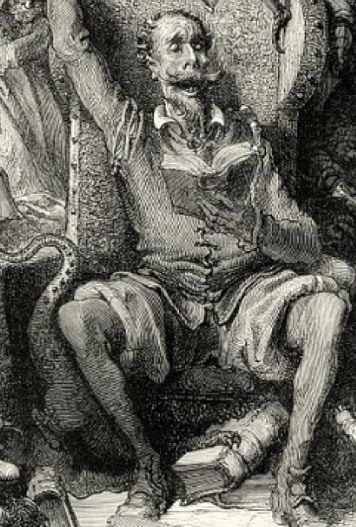
Don Quixote
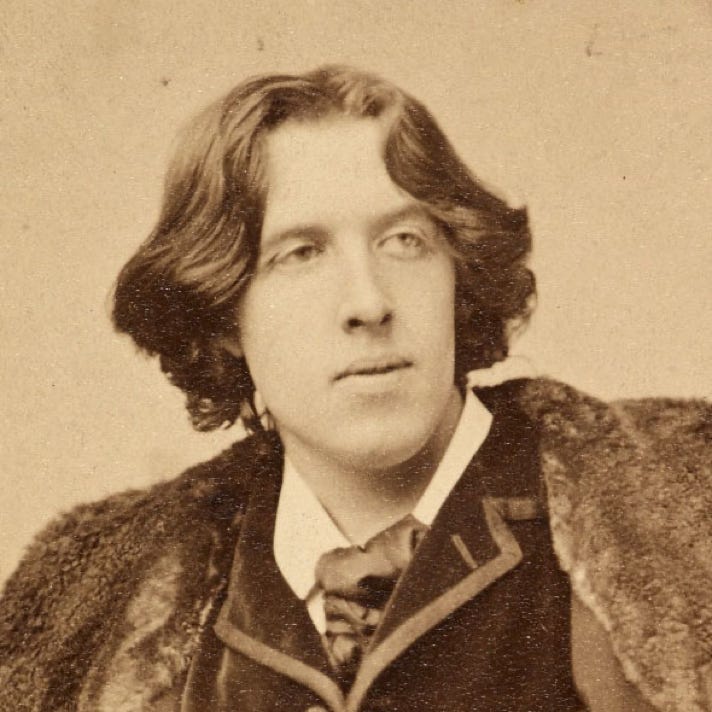
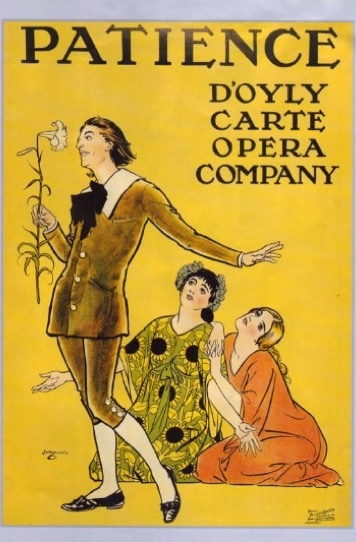
Wildean character from ‘Patience’,
with sunflowers and lilies
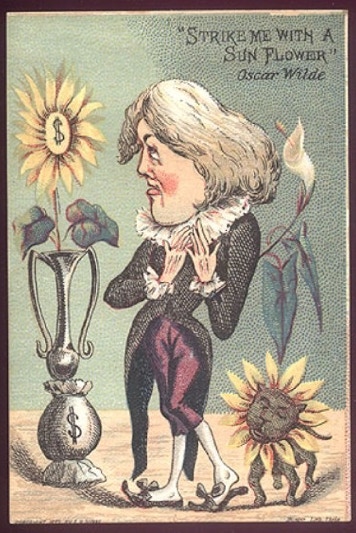
Oscar Wilde cartoon from 1882
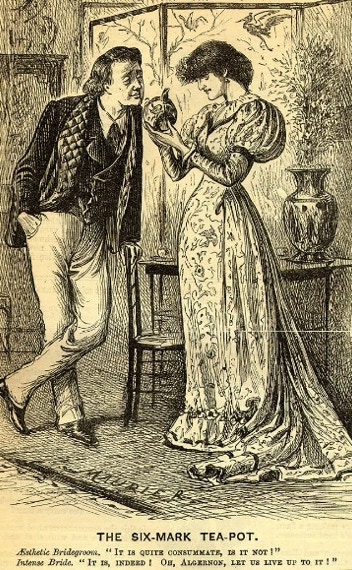
Du Maurier cartoon featuring Wildean blue china
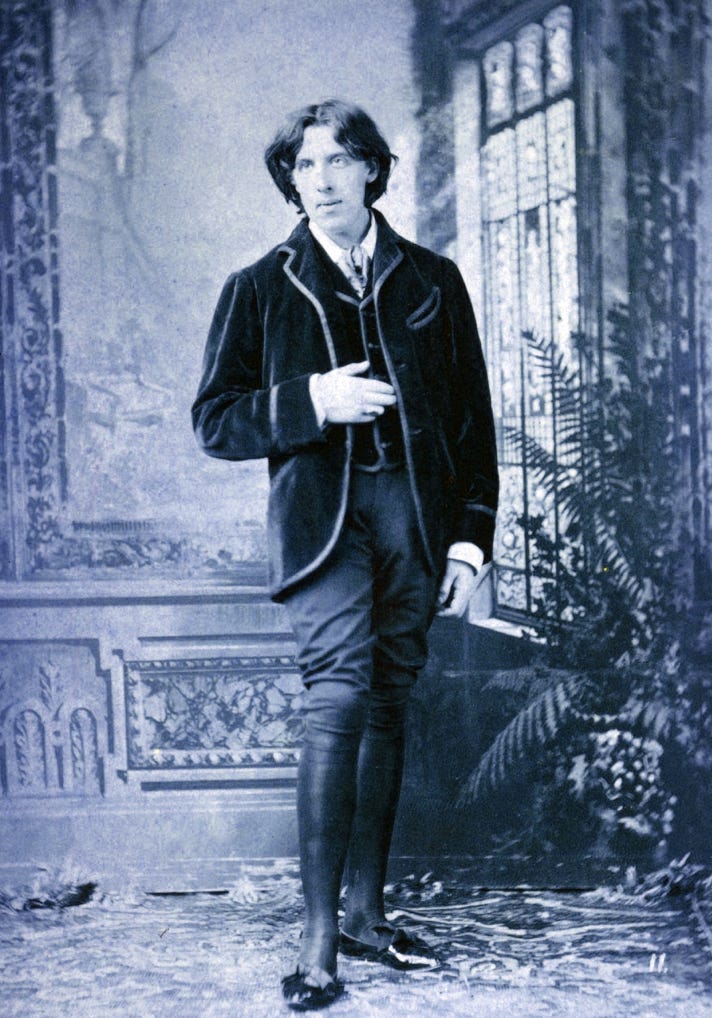
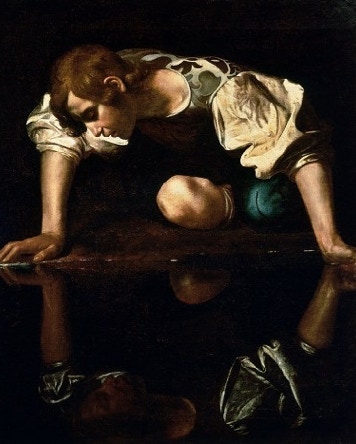
Narcissus (Caravaggio)